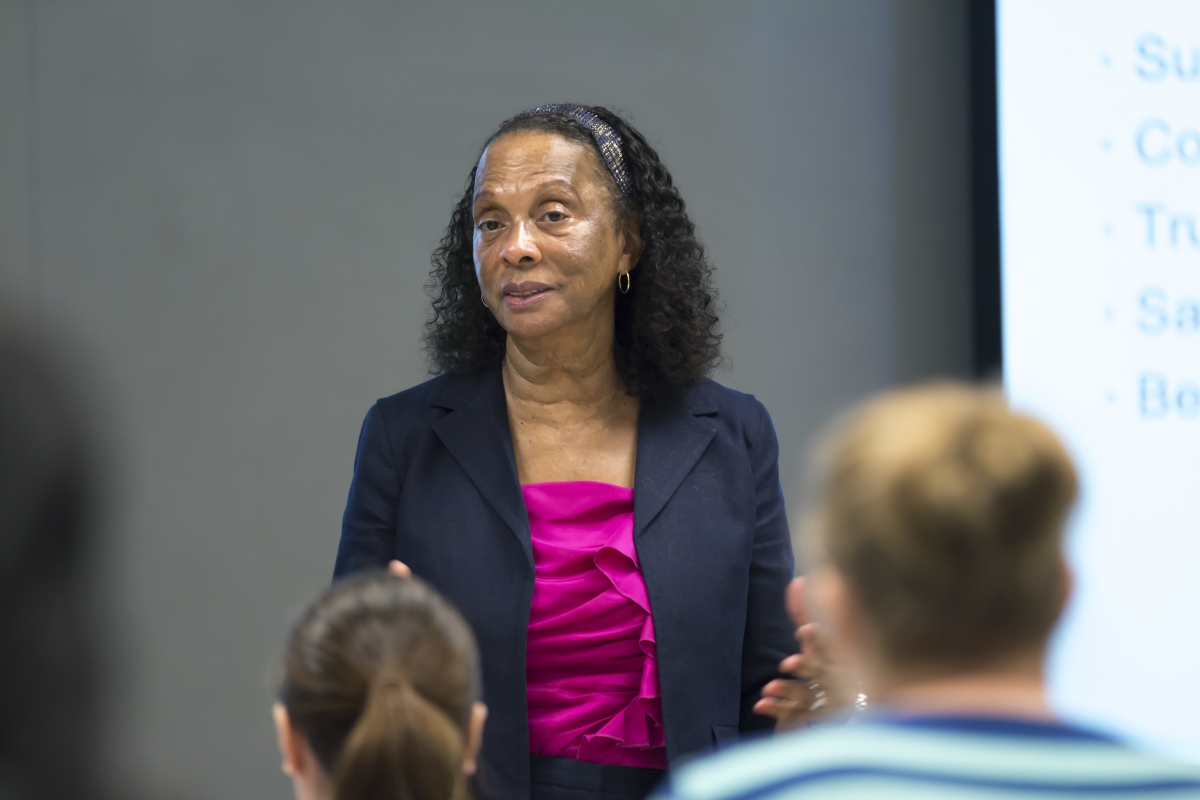Dr. Marian Harris: Social Work Educator of the Year
A UW Tacoma alumna nominated Dr. Harris for the award.
Dr. Marian Harris has spent a lifetime achieving. The University of Washington Tacoma professor started college at age 16. She received her bachelor’s from Florida A&M University, her master’s from Florida State University, and a Ph.D. from Smith College in Massachusetts. At the time, no one had finished a Ph.D. from Smith faster than Dr. Harris.
“I make a plan and I pursue that plan,” said Harris. This focus helped Dr. Harris receive a prestigious Bertha Capen Reynolds Fellowship while at Smith and a National Institutes of Mental Health postdoctoral fellowship. In 2015 she received the Outstanding Faculty Advisor of the Year Award from Phi Alpha Honor Society for Social Work. She started Xi Pi Chapter, Phi Alpha Honor Society for Social Work at UWT in December 2006. Dr. Harris has also written two books and is currently working on a third.
Recently, Dr. Harris added another honor to her growing list. The Washington Chapter of the National Association of Social Workers named her its Educator of the Year.

Dr. Harris is soft-spoken and precise with her words. She’s quick to point out she had to be nominated for the award. UW Tacoma alumna Dannette Johnson put Harris’ name forward for consideration. “She’s a great woman and a great social worker,” said Johnson.
Johnson currently works at the American Lake campus of the VA Puget Sound Health Care System, in Lakewood where she helps homeless vets get access to housing, mental health services, and substance abuse programs. Johnson took classes from Dr. Harris in graduate school and believes the experience helped her succeed. “She’s an excellent mentor and is always pushing me to continually improve,” said Johnson.
The praise flows in both directions. “I’m very proud of her and the work she is doing at the VA,” said Harris. This connection to service is something Dr. Harris tries to instill in her students. “I feel that being a professor has to go beyond the classroom. Social work is about helping other people and I try to model that for my students.”
Dr. Harris works with communities both locally and around the world. Here in Tacoma she serves on the board of directors for the Oasis of Hope Childcare and Learning Center which helps families in the Hilltop area. In the past she worked with mothers at the Mission Creek Corrections Center in Belfair. The program she spearheaded at the facility helped incarcerated mothers make a plan to reconnect with their children after leaving prison.
Dr. Harris recently attended the Belizean International Symposium on Education in Belize City. While there she tutored at a private school, La Isla Cariñosa Academy on the island of Cay Caulker. “I saw this little boy and I was so impressed with him because he was raising his hand and was answering all of these questions correctly,” said Dr. Harris. The school charges tuition but doesn’t turn away students who can’t pay. Funding for these students comes from sponsors.
Dr. Harris made the decision to pay for a child’s tuition, and as luck would have it, she ended up sponsoring that little boy she was so impressed with. “His name is Zahir and I’m planning to go back to Belize to see him,” said Harris.
Families are a key component of Dr. Harris’ work and research. She is a co-investigator for a $7.5 million grant from the U. S. Department of Health & Human Services Administration on Children, Youth & Families awarded to the Washington Department of Corrections and Partners for Our Children, UW School of Social Work. Dr. Harris and a group of other researchers, led by Dr. J. Mark Eddy of Partners for Our Children, will evaluate how the state helps incarcerated fathers and mothers transition back into society and be successful parents. “All of the prior research regarding parents, both dads and moms, demonstrates if a parent has a child and is able to have a positive relationship with that child when he or she leaves prison then recidivism rates go down,” said Harris.
The Educator of the Year Award sits on Dr. Harris’ desk. It’s a smart looking piece of cut glass with an inscription. She plans to show it to her students, not to boast, but to inspire. Most awards are, after all, a record of individual achievement but this particular award is a record of what Dr. Harris has done for others.



